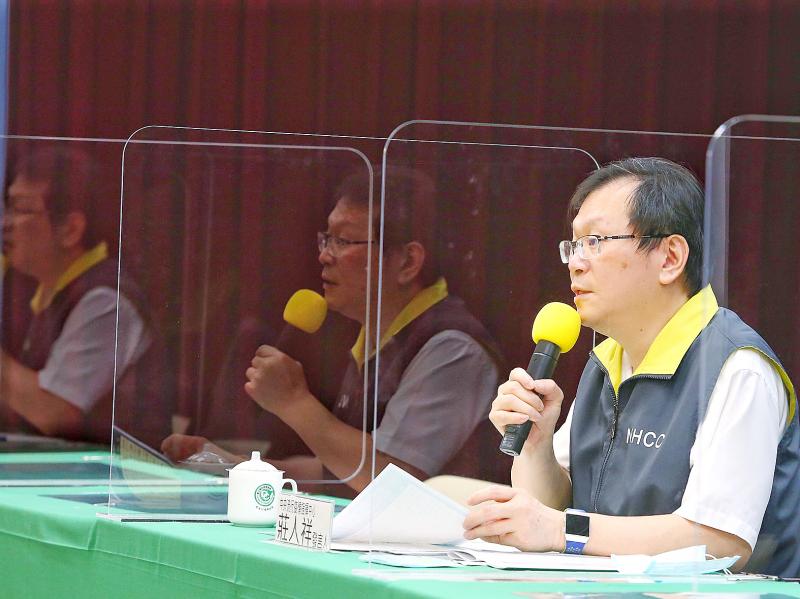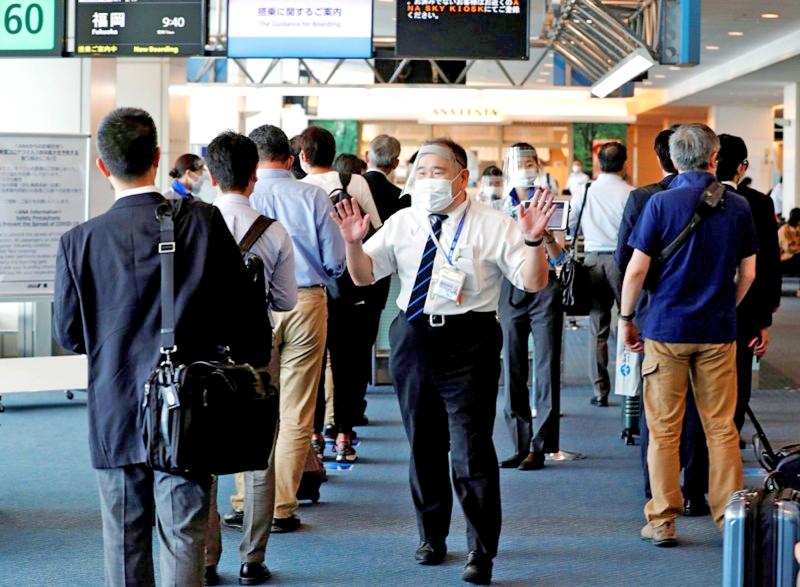Taipei and Tokyo have agreed to grant entry to each other’s business travelers, marking Taiwan’s first air corridor with another nation amid the COVID-19 pandemic, the Ministry of Foreign Affairs said yesterday.
Taiwan on June 22 started allowing business travelers from designated nations to enter under certain conditions, including providing a negative polymerase chain reaction (PCR) test result obtained within three days of boarding their flight.
The government at the time listed Japan as a medium-risk country, meaning people arriving from Japan could apply for a shorter quarantine period.

Photo: CNA
Since Japan was removed from the list on Aug. 5 when its COVID-19 cases spiked, arrivals from Japan have been required to undergo 14 days of isolation, Centers for Disease Control Deputy Director-General Chuang Jen-hsiang (莊人祥) said.
The Japanese government yesterday agreed to reopen its borders to business travelers from Taiwan, after bilateral negotiations started on July 22, the ministry said, referring the public to the Japan-Taiwan Exchange Association’s Web site for details.
Japan’s new policy is to take effect from Tuesday next week, when it would start a “residence track” for business travelers from Taiwan, the association announced on its Web site.

Photo: Reuters
To apply for a visa, Taiwanese businesspeople need to present a job employment certificate or work invitation to the association, the ministry said.
They would need a negative PCR test result obtained within three days of boarding their flight and would be required to take another test upon arriving in Japan, where they would also undergo 14 days of isolation at home or a designated facility, it added.
As strong partners and close friends, Taiwan and Japan have supported each other in the wake of many natural disasters, and collaborated to evacuate citizens stranded in other countries due to COVID-19 travel restrictions, it said.
The two nations hope to continue to boost economic ties and work together to combat the pandemic, it said.
Japan’s new policy also applies to travelers from Cambodia, Laos, Malaysia and Myanmar, after it first eased restrictions for those from Thailand and Vietnam, Kyodo News reported yesterday.
Japan denies entry to foreign nationals who have recently been to any of 159 countries and regions, including the US, China and all of Europe, it reported.

CALL FOR SUPPORT: President William Lai called on lawmakers across party lines to ensure the livelihood of Taiwanese and that national security is protected President William Lai (賴清德) yesterday called for bipartisan support for Taiwan’s investment in self-defense capabilities at the christening and launch of two coast guard vessels at CSBC Corp, Taiwan’s (台灣國際造船) shipyard in Kaohsiung. The Taipei (台北) is the fourth and final ship of the Chiayi-class offshore patrol vessels, and the Siraya (西拉雅) is the Coast Guard Administration’s (CGA) first-ever ocean patrol vessel, the government said. The Taipei is the fourth and final ship of the Chiayi-class offshore patrol vessels with a displacement of about 4,000 tonnes, Lai said. This ship class was ordered as a result of former president Tsai Ing-wen’s (蔡英文) 2018

‘SECRETS’: While saying China would not attack during his presidency, Donald Trump declined to say how Washington would respond if Beijing were to take military action US President Donald Trump said that China would not take military action against Taiwan while he is president, as the Chinese leaders “know the consequences.” Trump made the statement during an interview on CBS’ 60 Minutes program that aired on Sunday, a few days after his meeting with Chinese President Xi Jinping (習近平) in South Korea. “He [Xi] has openly said, and his people have openly said at meetings, ‘we would never do anything while President Trump is president,’ because they know the consequences,” Trump said in the interview. However, he repeatedly declined to say exactly how Washington would respond in

WARFARE: All sectors of society should recognize, unite, and collectively resist and condemn Beijing’s cross-border suppression, MAC Minister Chiu Chui-cheng said The number of Taiwanese detained because of legal affairs by Chinese authorities has tripled this year, as Beijing intensified its intimidation and division of Taiwanese by combining lawfare and cognitive warfare, the Mainland Affairs Council (MAC) said yesterday. MAC Minister Chiu Chui-cheng (邱垂正) made the statement in response to questions by Democratic Progressive Party (DPP) Legislator Puma Shen (沈柏洋) about the government’s response to counter Chinese public opinion warfare, lawfare and psychological warfare. Shen said he is also being investigated by China for promoting “Taiwanese independence.” He was referring to a report published on Tuesday last week by China’s state-run Xinhua news agency,

‘ADDITIONAL CONDITION’: Taiwan will work with like-minded countries to protect its right to participate in next year’s meeting, the foreign ministry said The US will “continue to press China for security arrangements and protocols that safeguard all participants when attending APEC meetings in China,” a US Department of State spokesperson said yesterday, after Beijing suggested that members must adhere to its “one China principle” to participate. “The United States insists on the full and equal participation of all APEC member economies — including Taiwan — consistent with APEC’s guidelines, rules and established practice, as affirmed by China in its offer to host in 2026,” the unnamed spokesperson said in response to media queries about China putting a “one China” principle condition on Taiwan’s